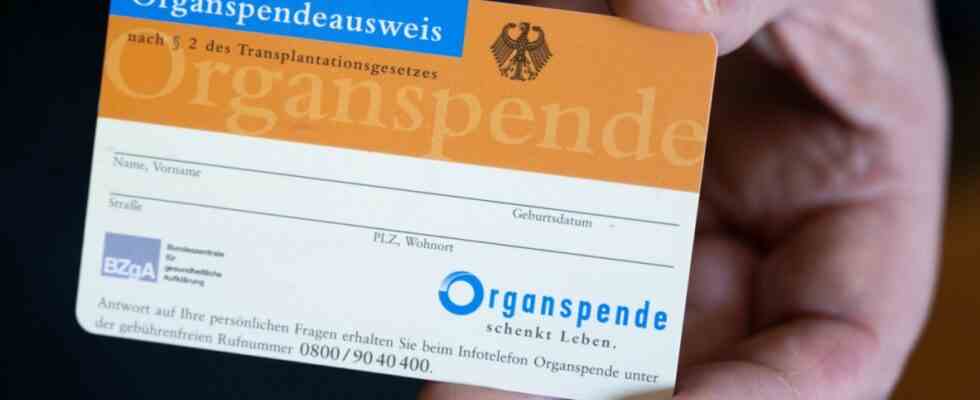Only recently, a case occurred in the Ebersberg district clinic that rarely occurs: a patient was found to be brain dead, but the body’s circulation was still intact – these are ideal conditions for an organ donation. The patient, however, had not stated anywhere whether he wanted this or had verbally expressed his wish to his family. So the relatives were called in, it was their decision that mattered: organ donation yes or no? They decided against it.
Such situations, as described by the transplant officer at the Ebersberg district clinic, Peter Lemberger, often happen in Bavaria and Germany: If there is no consent to donate an organ, in 50 percent of the cases the decision was made by relatives – so it says a Bavaria wide statistics for the year 2021. In Germany, the law of a consent regulation applies. This means that organ removal is only permitted if express consent has been given. This can be in the form of an organ donor card, a living will or any other document with a signature. If there is no document from the person concerned, the decision is passed to his or her relatives. Here, too, there are fixed rules, so the son, with whom there has been no contact at all for five years, cannot decide.
Ideally, the person concerned has decided for themselves whether they wish to donate an organ
“Of course, we respect every decision made by the relatives,” emphasizes Lemberger. Don’t judge, it’s not his place. There is, however, an ideal case: “It is best for us if the patient has stated his wish himself during his lifetime or has clearly communicated it to a relative.” After all, it shouldn’t be about what the relatives want – but what the person concerned wanted.
No transplants are carried out in Ebersberg, neither from dead patients nor from living ones, as would be the case with a kidney donation, for example. Such interventions may only be carried out in transplant centers approved for this purpose. This is the case in Germany 45 clinics to. However, as Lemberger explains, every clinic can become a donor center by removing organs. Namely, when a suitable donor is declared brain dead and consent has been given.
However, this has not happened in Ebersberg for years. Contrary to the popular belief that motorcyclists who have had an accident often have the ideal conditions to become a donor, according to Lemberger they are patients with massive cerebral hemorrhages. “We don’t usually have those because we don’t have neurosurgery at our clinic.”
Lemberger estimates that there is a potential donor in the Ebersberg district clinic about once a year. A number of factors must come together for organ removal to theoretically work. Apart from express consent, brain death must have occurred. This means that all regions in the brain have been irreversibly lost, but the circulatory system is still functioning. “Many people die without brain death,” explains Lemberger. For example, someone who dies of heart failure cannot become an organ donor.
Throughout Germany, the number of organ donors has fallen in the past year
Overall, the number of postmortem organ donors in Bavaria increased slightly last year, namely by 18 donors to a total of 128. Nationwide, on the other hand, there is a downward trend: according to statistics from the German Organ Donation Foundation (DSO) in 2012 there were still 1046 people who donated one or more organs after their death, but then the number dropped to 797 donors in 2017. In 2018 there was a high with 955 donors. Since then, the numbers have been falling again, last year there were only 869 donors, almost seven percent less than in 2021.
On their own, these numbers are not very meaningful, because you have to ask yourself a question. Are these numbers a lot or a little – or to put it another way: are they sufficient? To answer that, it is helpful to take a look at the waiting list of those waiting for an organ donation in Germany: there are currently around 1,000 8500 people.
These 8,500 fundraisers are not even matched by 900 donors. If the goal is to help as many people as possible who are dependent on organ donation, then you don’t need a calculator to see that the willingness to donate is too low.
Peter Lemberger is not only the transplantation officer, but also chief physician for anesthesia and the operative part of intensive care medicine, deputy medical director.
(Photo: District Clinic Ebersberg (oh))
“It’s a huge problem in Germany,” says Lemberger, who used to work at a university clinic and, as an anesthetist, was in charge of heart and liver transplants, among other things. “In Spain, for example, basically everyone donates, it’s ingrained in the culture.” in the international comparison Spain ranks second behind the US when it comes to donors per million population – 40.2 donors per million population. With 11.22 donors per million inhabitants, Germany is in 20th place, behind countries such as Austria, Estonia, Argentina and Iran.
Peter Lemberger cannot say how willingness to donate is in the district of Ebersberg. In addition, there are rarely cases at the district clinic in which the question of an organ donor card becomes relevant. But it seems plausible that it is not too high according to the Bavarian and Germany-wide trend.
Further information on the subject of organ donation and the download of an organ donor card is available online at German Foundation for Organ Transplantation and at Bavarian Ministry of Health.

